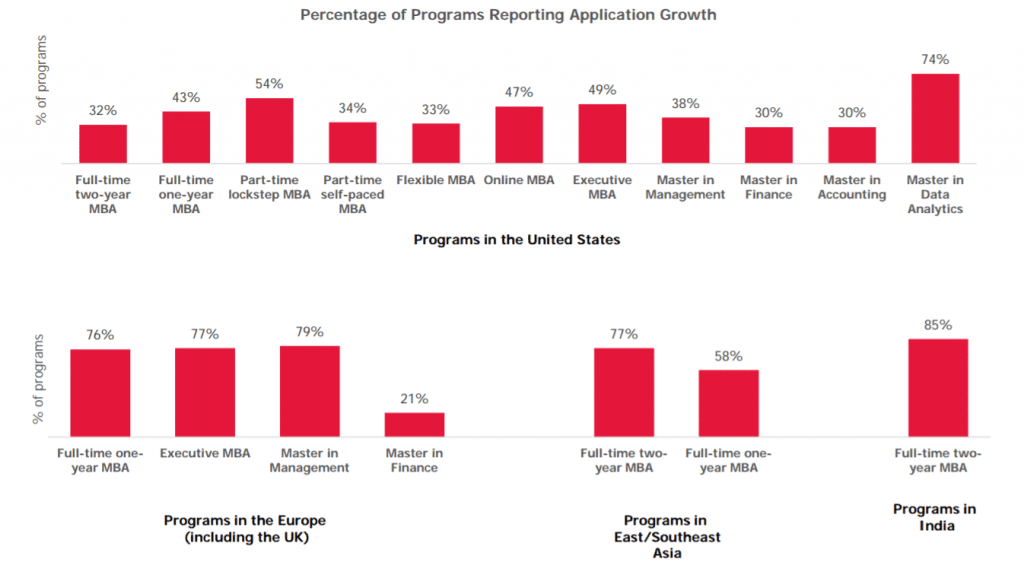Neely Center Opens at USC Marshall School of Business

According to USC News, the Neely Center for Ethical Leadership and Decision Making has officially opened on the school campus. The Center is a multidisciplinary research center focused on examining ethical leadership and decision-making processes. Jointly housed at the USC Marshall School of Business, the USC Viterbi School of Engineering, and the USC Price School of Public Policy, the Center is led Ali Abbas. Continue reading…
U.S. Small School MBA Programs are Shrinking

Large U.S. graduate business programs—those with more than 200 students—report that times are good. In fact, three in four (73 percent) of these programs saw application volume increase this year, according to the 2017 Application Trends Survey, released yesterday by the Graduate Management Admission Council (GMAC).
But the news is not as rosy for smaller programs. For programs that count 50 students or fewer, only 39 percent saw growth in application volume, while 7 percent remained steady, and 55 percent lost applicants year over year. Overall, among full-time, two-year MBA programs, less than a third (32 percent) of U.S. programs reported application volume gains this year, whereas 64 percent saw application volume decreases. The results mark the third consecutive year in which the majority of U.S. full-time, two-year MBA programs experienced application volume declines. Just three short years ago, those numbers were almost reversed, with 61 percent of U.S. programs reporting application volume increases in 2014.
Elsewhere in the world—including in Europe, East and Southeast Asia, and India—business schools had a very different story to tell. In each of these regions, the vast majority of programs saw application volume increases. In Europe, 76 percent of one-year, full-time MBA programs saw growth; in East and Southeast Asia, 77 percent of full-time, two-year MBA programs saw growth; and in India, 85 percent of full-time, two-year MBA programs reported increased application volume.

Source: 2017 GMAC Application Trends Survey
A Combination of Factors Chills Overall Demand for U.S. Graduate Business Programs
What gives? Why are business schools around the world seeing such demand for their programs while U.S. schools—with the exception of the largest, best-known schools—faltering?
“Demand for graduate business education remains strong, especially among the largest programs, which also tend to be the most well-known programs with brand recognition,” Sangeet Chowfla, GMAC President and CEO, said in a press release. “While non-U.S. programs are thriving, a strong economy and a disruptive political climate are likely contributing to the downward trend in application volumes among smaller U.S. programs this year.”
Strong Economy Hurts Domestic Application Volume
Citing past GMAC research, the current GMAC report notes that application volume to U.S. graduate business programs frequently runs counter-cyclical to the labor market. When jobs are plentiful, fewer see the need or can justify the opportunity cost of taking time out of the workforce to pursue an advanced degree. This could help explain why only 42 percent of U.S. programs reported growth in the domestic market this year, down from 61 percent in 2016. Exceptions to this trend can be seen in two degree programs, though, according to GMAC. Domestic application volumes grew for more than half of all full-time, one-year MBA programs (54 percent) and Master’s in Data Analytics programs (58 percent).
Trump Rhetoric Takes a Toll on International Applicant Volume
More notable than the decline in domestic applicant volume was the decline in international applicant volume for U.S. programs. Less than a third (32 percent) of U.S. programs saw more international applicants this year than last—down from 49 percent the year before. Master in Data Analytics programs proved the only exception—67 percent of these in-demand programs saw international applications increase.
In fact, for the bigger, better-known U.S. schools that have been largely buffered from overall application volume decline, it’s because domestic applicants have applied in increasing numbers at those schools, offsetting declines in international applicants. According to GMAC, there has been a resurgence of domestic applicants at large programs, with 69 percent reporting increases in this applicant pool this year over last. Of these same programs, only 38 percent saw international application volume increase.
READ MORE: What are the Most Common Application Mistakes?
Other regions of the world, meanwhile, may be attracting some of the international applicants that have been giving U.S. programs a wider berth given concerns about potential changes to immigration policies and their impact on visas both for study and for work. According to this latest GMAC survey, twice as many graduate business programs in Europe and Canada saw international application volume increases as did programs in the United States. In Canada, 77 percent of programs reported upticks in international applicants, up from 46 percent in 2016. In Europe, 67 percent of programs saw international application volume growth, a more modest rise over the 65 percent reported there the year before. But even in the United Kingdom, where there was concern that the 2016 Brexit referendum could adversely impact international applicants in some of the same ways that Trump’s election and proposed changes to immigration policy did in the United States, almost two-thirds of programs have wooed more international applicants, not fewer. Notably, graduate business programs depend more heavily on international applicants than on domestic applicants, In Canada, domestic applicants comprised 30 percent of overall applicant volume, and in Europe, just 11 percent.
Women Are Applying to Graduate Business Programs at Record Levels
Another significant finding from the 2017 Application Trends Survey was an increase in women applicants. Women now represent 42 percent of all applications received by the participating programs, up from 37 percent from four years ago. Looking specifically at MBA programs, women accounted for 39 percent of applications, a six-point percentage gain since 2013.
Growth in female application volume was most widespread among MBA programs—44 percent saw increases this year over last. Fewer business master’s programs—39 percent—reported increased female applicant volume.
Additional Key Findings
A few other interesting statistics revealed by the most recent survey:
- Overall part-time MBA volume has declined or remained stagnant since the Great Recession. The only exception is part-time lockstep programs, which enroll students in cohorts and provide more of a consistent set of classmates. Of these, 54 percent reported a growth in applications.
- Employer sponsorship remained stable, with approximately 52 percent of part-time students expecting to receive support.
- The experience level of applicants also remained consistent, with the majority of full-time MBA applicants having between three and 10 years of prior work experience.
The Application Trends Survey 2017 reviewed a total of 351 business schools around the global and 965 total graduate business programs—a record for the survey. To see the full results, download the 41-page report.
This article has been edited and republished with permissions from Clear Admit.
Top MBA Recruiters: Time Warner

We live in a time where media conglomerates are larger than ever, tracking everything people watch, listen to, and stream. While this can be a pretty scary thought, it means these companies deal with lots of money, and companies that deal with lots of money need lots of MBA talent. One of these media conglomerates is Time Warner Inc. Continue reading…
DePaul Business Professor Explains How to Help in Hurricane Relief Efforts

In recent weeks, two massive storms devastated parts of the U.S. and Central America. Hurricanes Harvey and Irma killed more than 70 people and displaced thousands. According to CNN, Moody’s Analytics expects that the total amount of damage will exceed $150 billion, which is on par with the cost of the much deadlier Hurricane Katrina in 2005. Continue reading…
Choosing the Best Business School for Consulting

If you are a prospective MBA applicant looking to business school as a way to enter or accelerate your career in the consulting industry, you are certainly not alone. According to the 2017 Prospective Student Survey conducted by the Graduate Management Admissions Council (GMAC), consulting is once again the most sought-after postgraduate industry, with 33 percent of applicants surveyed citing consulting firms as their destination of choice. The consulting function, too, is a top draw. One in four indicated it as their chosen job function, after just marketing/sales (30 percent) and finance/accounting (28 percent).
With so many MBA graduates vying for roles in the consulting field, one of the best ways to distinguish yourself is by going to one of the business schools best known for training top-notch consultants. Of course, this requires thorough research and a deep knowledge of individual school programs. Lucky for you, Clear Admit has done some of the legwork.
Consulting Continues to Be a Top Draw for MBAs
Finance—and investment banking in particular—took a hit following the financial crash of 2008. And the tech sector has been gaining ground as a top destination for MBA grads. But along the way, the consulting industry has held its own, with MBAs clamoring to work for both towering giants in the field as well as at an increasing number of boutique firms now in the marketplace.
What’s the allure? Part of it is the diverse work. Consultants get to think creatively and solve problems, analyze both the big picture and the details, and work on teams juggling multiple assignments. Top salaries don’t hurt either. Recent MBA graduates taking jobs at firms like McKinsey & Company, Boston Consulting Group (BCG), and Bain & Company—known as ‘the MBB firms’ in industry parlance—reported base salaries in 2017 of between $147,000 to $152,500, with additional signing bonuses of $25,000, according to managementconsulted.com, an online resource for the consulting industry.
Choosing the Best Business School for Consulting
Determining which leading business school will best prepare you for a career in consulting requires looking at a range of factors. A logical place to start is by examining career outcomes at individual schools, both in terms of summer internships and full-time jobs. If possible with the available data, you also want to get a sense of how well a school has done placing career-switchers, namely those without prior consulting experience, in coveted consulting roles, since barriers for entry for these grads are understandably higher than for their counterparts who have already worked in the field.
It can also be instructive to see which of the powerhouse consulting firms donate to which leading business schools. Finally, it helps to understand how a given school goes about teaching its students to be consultants, what role experiential learning plays, whether you can hope to learn directly from superstar professors in the field, and what extracurricular resources are in place to help you land your dream consulting gig.
Consulting at UVA Darden
The University of Virginia’s Darden School of Business sent more of its MBA graduates into consulting than any other U.S. school, with 38 percent of the Class of 2016 pursuing work in the consulting industry and 38 percent choosing a consulting function. By comparison, Harvard Business School (HBS) sent 25 percent of its 2016 graduates into consulting, and Stanford Graduate School of Business sent just 16 percent.
As for the top recruiting companies at Darden, Boston Consulting Group snapped up 18 members of the Class of 2016, followed by McKinsey & Company (14), PwC (13), and Accenture (10).
In terms of pay, the average base salary for a Darden MBA heading into consulting was $135,771 with a signing bonus of $26,927. While this isn’t the highest salary in the industry—it falls a few thousand dollars short of offers reported by students at schools like Kellogg School of Management—it is the highest average salary for all Darden MBAs.
Darden’s Classroom, Curriculum, and Professors
As for how Darden trains its MBAs to enter a career in consulting, the school offers a career track concentration in strategy consulting. This concentration is designed to immerse MBA students into the consulting process by helping them identify and deepen their consulting skill sets.
Darden is also known for its case study method of teaching and learning. This method confronts Darden MBA students with challenging, real-life business situations and teaches them how to analyze each situation to come up with a solution—just as they will be called upon to do in a consulting career. Over the course of MBA students’ two years at Darden, they’ll complete in more than 500 case studies on a variety of topics, industries, and diverse environments.
As for Darden’s faculty, many of the school’s professors have an in-depth knowledge of consulting with a breadth of research dedicated to all facets of the field. For example, Samuel E. Bodily, a professor of business administration, teaches “Decision Analysis” to first-year students and “Management Decision Models” to second-year students while also consulting with many corporations, utilities, and government agencies. And Scott. C. Beardsley, Darden dean since 2015, spent 26 years at McKinsey & Company before joining the school.
Outside the Classroom
Darden is home to the Consulting Club, a student organization designed to support students interested in the consulting industry. The club regularly holds events such as consulting industry panels, networking 101, consulting conferences, case competitions, mock interview sessions, internship preparation workshops, and more. And many large consulting companies are club sponsors, including Deloitte, AT Kearney, Bain & Company, EY, and Accenture.
In addition, there are also a variety of consulting projects for MBAs to participate in. These projects help MBAs learn how to develop business plans, create financial forecasts, and perform marketing analysis. For each project, teams of three to six students will work with corporations, global businesses, or non-profit organizations to provide strategy evaluation and planning services.
INSEAD For Consulting
In terms of sheer numbers, no school sends more students into consulting jobs than INSEAD. According to the school’s latest 2016 MBA employment report, 46 percent of INSEAD MBAs took a job in the consulting sector and 48 percent assumed a consulting function. That’s a whopping 479 students accepting a position as a consultant—almost half of the 999 students who filled out the employment report.
INSEAD’s MBA graduates took jobs with such companies as McKinsey (which hired 125 INSEAD grads in 2016), BCG (67), Bain (48), Strategy& (24), and Accenture (16). And it’s no wonder the major players like INSEAD. Many alumni hold prominent positions such as chairmen, CEO, or senior leader at these same top consulting firms.
As for where these consulting grads work, they’re spread out around the world. More than 100 consulting graduates took jobs in Western Europe, 41 of those in the United Kingdom. Another 83 graduates headed off to consulting offices in Asia Pacific, including 23 each in Singapore and Australia. But the single most attractive country for INSEAD consulting grads was the United Arab Emirates, which drew 42.
INSEAD also features an alliance with the University of Pennsylvania’s Wharton School, allowing INSEAD students to spend one of their five periods studying at the U.S. school. INSEAD has a similar campus exchange with Kellogg as well. These exchanges afford INSEAD students access to those schools’ career management centers as well, which can be especially valuable in terms of making connections to U.S. recruiters for students who are interested in working in consulting in the United States after graduation.
In terms of what its consulting grads command in salary, INSEAD also shows strong numbers, albeit lower than Kellogg and Darden. For 2016, the overall mean salary in consulting was $107,300 USD, the overall median salary was $109,500 USD, and the overall annual median sign-on bonus was $25,000, with 76 percent of salaries coming with a sign-on bonus and 83 percent with a performance bonus around $24,500.
Proud of its success in helping career switchers enter new industries, INSEAD shares data about how many of its graduates heading into consulting started out there and how many used business school to make a pivot. Of those graduates taking jobs in consulting after INSEAD, 67 percent held pre-MBA roles in consulting. But 34 percent of those who were financial services professionals also successfully switched to consulting, as did 56 percent of former technology, media, and telecommunications professionals and 38 percent of former corporate sector professionals.
How Consulting Is Taught at INSEAD
INSEAD’s accelerated 10-month MBA is composed of five, eight-week periods built around core courses and electives and concluding with an exam, essay, and/or project. There is no preferred teaching method at INSEAD; instead, individual professors choose the method they feel is best. However, no matter the teaching style or technique, each class is sure to have lively exchange opportunities and diverse study groups.
In terms of core courses, students will start out their first eight weeks with an “Introduction to Strategy” course and will continue their learning into the next period with “Process & Operations Management.” As for electives, over a dozen courses are offered under the Strategy heading including the “Strategy Lab,” which provides MBA students with a practitioner’s view of how consultants tackle projects.
Who Trains Consultants at INSEAD
There are more than 25 resident strategy professors across INSEAD’s three campuses, as well as around a dozen visiting faculty members. Of these, several are former consultants, bringing experience straight from the trenches at McKinsey, Monitor Group, and Accenture, among other leading firms.
Two INSEAD professors, W. Chan Kim and Renée Mauborgne, authored a best-selling book called Blue Ocean Strategy, which spawned the 2007 launch of the INSEAD Blue Ocean Strategy Institute. The institute offers several programs and electives that support the development of aspiring consultants, including a mini-elective, “Blue Ocean Strategy Simulation,” that lets students apply the trademark Blue Ocean Strategy toward managing a fictional company.
Beyond the Classroom at INSEAD
INSEAD’s accelerated 10-month program can make it hard for some student groups to gel, but despite this obstacle, the INSEAD Consulting Club seems to have an active campus presence. Much like at Darden, the Consulting Club at INSEAD provides resources to help INSEAD students prepare for consulting interviews and careers, including workshops, networking, and recruiting events with consulting firms. It also publishes the INSEAD Consulting Club Handbook, free to Consulting Club members, which offers an overview of the industry, profiles of individual firms, and sample cover letters, résumés, interview tips, and practice case questions.
INSEAD also features regular consulting case competitions, including the A.T. Kearney Global Prize Competition. As many as 15 teams from INSEAD compete against each other, with winners advancing to represent INSEAD in a regional competition against seven other European business schools. The winning European school then battles the winning North American school for the Global Prize.
The Best Nonprofit MBA Programs in Los Angeles

Many believe that business is inherently selfish. However, there are a plethora of nonprofit organizations that could not exist without the skills of talented administrators, dedicated solely to the business and financial aspects of the company. MBA skills are coveted in the nonprofit industry, as they can make a massive contribution to helping the organization thrive.
Many MBA programs take into account the need for overlap in business and social change. Below, we’ve laid out three of the best Los Angeles programs for MBAs looking to pursue nonprofit work.
The 3 Best Los Angeles Nonprofit MBA Programs
Anderson School of Management—UCLA
The UCLA Anderson School of Management MBA program offers a specialization in Social Impact for students hoping to use their business acumen to have a positive influence on their community, both locally and globally. This program provides ample opportunities for students to better parts of the world through innovation and creative problem-solving, positioning them to pursue a career in the nonprofit arena, if that is their goal.
International Field Study Projects are an integral part of the nonprofit learning experience. For their second year Capstone Projects, all Anderson MBA students can choose to pursue the Applied Management Research (AMR) program. The AMR Projects give students a chance to work with companies and nonprofits to solve a strategic problem. Many of the AMR Projects help struggling communities. In 2017, a group of students tackled building a model to improve screening and treatment of non-communicable diseases to a rural village in South Africa.
SEE ALSO: “The Most Affordable Los Angeles MBA Programs”
Marshall School of Business—USC
Marshall School of Business at USC partnered with Zelikow School of Jewish Nonprofit Management at Hebrew Union College-Jewish Institute of Religion to provide students with the chance to obtain a dual degree (MBA/M.A.) in Business Administration and Jewish Nonprofit Management. The M.A. emphasizes both nonprofit management and Jewish studies. This challenging track requires 88 units of coursework as well as two years of fieldwork. Students in this program can take a 12-month internship in Sacramento, CA or Washington DC while continuing to attend classes in these areas. This track is ideal for students pursuing a career in the Jewish nonprofit sector, and includes classes like Nonprofit Management and Leadership and Grant Writing Practicum.
Peter F. Drucker and Masatoshi Ito Graduate School of Management—Claremont Graduate University
The Peter F. Drucker and Masatoshi Ito Graduate School of Management dual degree in Public Health and Business Administration is an excellent option for students seeking a career in the nonprofit healthcare field. This MBA/MPH allows students to combine business acumen with an exhaustive knowledge of the intricacies of public health over the course of three years. Though this program does not exist exclusively to educate students in the nonprofit sector, the combination of healthcare and business education makes these grads a perfect fit for health care-related nonprofit work. Students will also benefit from the knowledge of professors like Jay Prag, Ph.D., who serves on the board of directors at LINC Housing, a nonprofit low-income housing developer, and whose research often delves into the nonprofit world. This program will enable students to use business skills to increase the effectiveness of healthcare institutions in their communities, as well as internationally.
